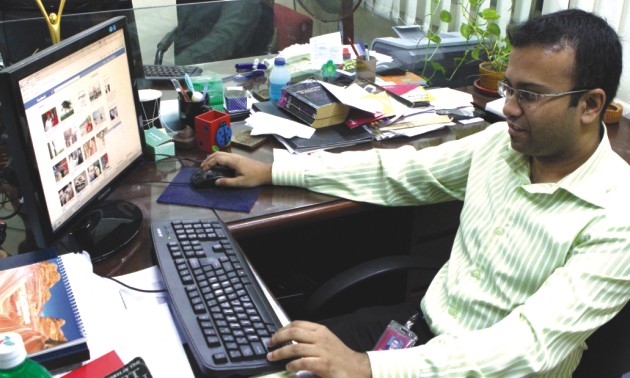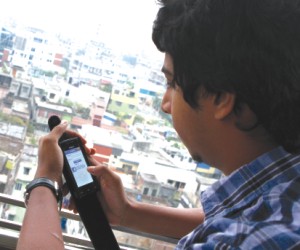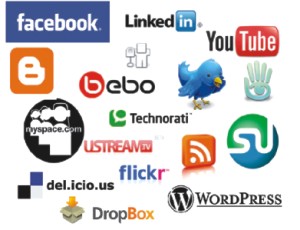Cover Story
Online Ties

Students take advantage of free wifi connection at Dhaka University. Photos: Zahedul I Khan
While cosmopolitan lifestyle is demanding too much time away from natural social relationships, the Internet is offering new forms of social relations through social networking sites, affecting our day-to-day interaction and relationships within the family and the society as a whole.
Tamanna Khan
A decade ago the chances of meeting a long-lost childhood friend was so bleak that friends in Hindi or Bangla films, would either have a common song or a broken piece of emblem to identify one another if they ever met in the future. However, technology has changed the scenario completely. Today, not only can you keep track of your current friends, but thanks to the innumerable social networking sites (SNSs), you are more likely to meet your long-lost friend on the net, like 24-year-old Arundhuti did. “I met a friend from class-two after 16 years. If the social networking sites were not there where would I find a common platform to meet old friends who I have almost forgotten?”
In fact, this is one of the main reasons why a popular singer, who grew up abroad, and now living in Bangladesh, uses social networking sites. “I have lots of friends with whom I am in touch with only because of Facebook. They are my childhood friends who live abroad. Since they are on Facebook, I know, I can keep in touch with them, I know I can find them,” she says.
Before Facebook slithered into the lives of urban Bangladeshis, websites like classmates.com had already made their presence known on the Internet and were available to users in the United States and Canada for finding their school, college and work friends. According to a study by Danah M. Boyd and Nicole B. Elison, SixDegrees.com was the first recognisable social networking site launched in 1997 that matched today's definition of a SNS according to a study by American scholars Danah M Boyd and Nicole B Elison –a web-based service that allows individuals to construct a public or a semi-public profile within a bounded system, articulate a list of other users with whom they share a connection and view and traverse their list of connections and those made by others within the system.

Late working hours and immense traffic on the roads make face-to-face interaction with
friends and relatives on a daily basis difficult.
The flood of SNSs like Friendster, LinkedIn, MySpace, Orkut, Hi5, Flickr, Yahoo! 360, Facebook, YouTube, Bebo, Windows Live Spaces, Cyworld, Twitter and so on appeared towards the onset of the twenty-first century. While email and chat applications allowed users only to interact with acquaintances and strangers, social networking sites, allowed users to publicise themselves – present their image, ideas and most importantly their social contacts.
Dr Md Monirul Islam Khan, professor of Sociology at the University of Dhaka, who does not use his account on Facebook, that he opened a year ago, says, “social networking sites are more relevant for the younger people who can immediately publicise their achievements on the websites.” He also adds that for people of his age who have already reached certain level of social attainment, such virtual acknowledgement is not required.
Dr Islam also calls the use of SNSs a class phenomenon; “Facebook of course is a well-off family's children's thing. You won't find any Facebook users among slum-dwellers.” He thinks even in the United states where every household still does not own a computer, spending time on social networking sites is very much a class phenomenon. A study carried out by the Pew Internet and American Life Project in 2007 shows that only 55 percent of all American teenagers use social networking websites and 91 percent use it to keep in touch with people they already know.
Twenty-eight-year-old Shohel Khan had opened a Facebook account when he came to Dhaka to study at a private university. “My classmates as well as roommates encouraged me to open an account. I used to do facebooking between classes at the computer lab or at night in my friend's computer, when there was nothing to do at the hostel,” he says. After completing his studies, Shohel went back to his village where he has a laptop, but no Internet connection. “In our village, very few people have computers and yet fewer have Internet connection obtained through mobile networks. There is only one computer shop in our village bazaar that has Internet connection. Most of the time the place remains crowded with people using the computers for tasks like typing and printing.”
 |
One of the most important aspects of social networking sites is the ease of communication and connectivity at a minimal cost. |
The hectic schedules of urbanites present a different scenario from the one Shohel describes. Late working hours and immense traffic on the roads make face-to-face interaction with friends and relatives on a daily basis difficult. Fifteen-year-old O'Levels candidate Rakib, who spent majority of his time at school and coaching centres, says he can only communicate with his sister, who lives in Australia, at night through Facebook. “Right now, Facebook is the only interface that links us to the rest of the world,” asserts Rakib's friend Mehrin.
Arundhuti, a telecommunication engineer who works for a media firm, thinks Facebook provides a short and convenient break from work. “When I don't have any work at office, for passing my time, I do use Facebook. It is the best way to take a small break. Say I am working on my PC and I need a break, instead of going out of the room, or away from my desk, I just browse Facebook and see what my friends are doing or what interesting things are going on.”
The section-head of a daily newspaper feels that using the net for socialising while at work is acceptable as long as employees finish the task at hand first: “ I find it very irritating when I know they have a lot of work left but instead of finishing it they are wasting time doing this.” She says that it is especially disappointing when she has to take the burden of extra load of work, while her employees, under the pretence of work spend their time socialising at their work stations. “Sometimes, I found people facebooking and they actually tried to hide it by minimising the screen, but I already knew what they were doing.”
However, when asked whether such socialisation on the net during office hours conflicts with work ethics, she had a different opinion. “I don't think it is a problem because then ethically you should not be taking too many cigarette or tea breaks. The whole point is getting the work done. If it is going to hamper the quality of your work and the efficiency of the person then it is definitely not acceptable.”
Yet in many multinational and corporate houses, social networking sites like Facebook and Windows Live spaces are blocked. Some universities like North South and American International University Bangladesh have blocked social networking sites in their computer lab. Arundhuti, who was a student of North South says, “if a teacher does not allow us to side-talk in class, then why would they allow students to use lab timing for socialising. Yet people use proxy servers to get into social networking sites and misuse lab facilities.”
In fact, almost all Facebook accountholders used proxy servers to log on to their accounts when access to the site was blocked in Bangladesh on May 30, 2010 after a young man posted satirical images of the prime minister and the leader of the opposition. “It is very easy to pass on information through the social networking sites,” says Arundhuti. While websites belonging to a group with a certain ideology or dedicated to a certain topic are visited only by people of that group or with interest that topic, social networking sites are visited by anyone and everyone, she adds. “People who may not be knowledgeable about the topic may be misguided by the wrong information,” she says, citing example of misleading information about Bangabandhu Sheikh Mujibur Rahman on Facebook. Yet she thinks that such activity can conversely entice people to research on the topic further.
Security and privacy issue remains one of the major concerns about SNSs. Eram, who studies in class eight at an English medium school, says, “People often use fake accounts to insult others. There is one person in our class who uses names like dangerman, broken-heart, and naughty boy to create fake accounts. He once hacked into my account and wrote cheap things on my wall.” Eram denies making friends with unknown people in SNSs. “I think there is a software by which you can hack into anyone's account. But you need the email Id, which you can find on the profile.”
 Not just teenagers, 30-year-old private service holder Anik shares a similar experience where one of his female friend's engagement was broken after her ex-boyfriend posted inappropriate pictures on Facebook and tagged her on them. “That is another thing also, anybody can tag you on pictures and you cannot un-tag them. You may not necessarily want those pictures on your account but they will be there,” complains Anik. Not just teenagers, 30-year-old private service holder Anik shares a similar experience where one of his female friend's engagement was broken after her ex-boyfriend posted inappropriate pictures on Facebook and tagged her on them. “That is another thing also, anybody can tag you on pictures and you cannot un-tag them. You may not necessarily want those pictures on your account but they will be there,” complains Anik.
Though privacy setting on most social networking sites allow users to hide their name, email Id and other information from others who are not on their friend list, most users are not well aware of these options, opines Arundhuti. She thinks banning or blocking SNSs for these security reasons is no solution. Rather, she applauds the young university student who complained against a 28-year-old assistant engineer, Aleem at Kotwali Police Station in Chittagong on November 30, making the first cyber crime report in Bangladesh. After his arrest, Aleem admitted opening a fake account under his ex-girlfriend's name and posting indecent pictures and abusive comments to taint her reputation.
Some people use more than one SNSs application and some even keep more than one account under the same application. For instance, 13-year-old Navid has four accounts, “ one is for my friends, family members and relatives, the second one – only for my friends and the third one is only for myself which I use to flirt with girls. These three are under my real name. The fourth account is totally a fake account for seeing how boys irritate girls. The name I used is Sarah Tasneem. I used another name for it, only because I wanted to tease my friends and see how they interact with others.”
The mother of a 15-year-old also says it has become a common scene in many households to find family members sitting in their own rooms hooked on the internet instead of sitting together to have some quality family time. Yet when the question of strangers developing friendship with youngsters comes, she thinks that the only thing that can protect the teenagers is the values instilled in them from childhood. Unlike Torsa's parents, who have opened Facebook account only to spy on their 13-year-old, she would never do such a thing that would violate the trust between parents and children.
Celebrities usually keep separate accounts for fans and their friends, informs a popular musician. “I have one personal Facebook account and another one for my fans. Another person opened that account and he manages it. You can find more than one fan page in the name of a celebrity that are opened and maintained by fans.” She admits she also has a Twitter account and says for a writer it is a great way of expressing oneself in 140 words. “Most celebrities prefer Twitter accounts because you are in touch with the whole world and people interested in you can follow you.”
In fact, for freelance filmmakers like Asif Islam, social networking sites can be used as a promotional tool. “I use it not just to promote myself, but also to promote those I work with, such as the artists, because I upload promos of music videos and films. Besides, there are other filmmakers on the friend list of my Facebook account and I get to know about their upcoming works. Plus many of them upload the 'behind the scene' videos which are quite interesting for me.”
Unlike Asif, his father-in-law, Ali Azam, chairman of Adex Corporation Ltd, uses Facebook only for playing poker. He rather prefers using Windows Live Spaces for business purposes as it helps him to communicate easily with his Chinese business clients who are not fluent in spoken English. “If they cannot tell the English name of a certain part of a product they can show me the part through videos or pictures. Besides, it is better than telephone because the cost is almost nil,” informs Azam.

L-R: A home-maker who regularly interact with her friends and family abroad through Facebok. Social networks are a big hit among teen for when face-to-face interaction is limited.
One of the most important aspects of social networking sites is the ease of communication and connectivity at a minimal cost. In fact, 54-year-old housewife Julekha Akter Banu, who has opened an account at a social networking site two years ago to see the updates of her grandchild who lives abroad, is very happy with this scientific invention. She says, “through this we can learn a lot, communicate quickly and easily and above all economically.” Julekha's entrance into the world of Internet first happened 10 years back when her youngest son went abroad for studies. “At first, I used to maintain communication with my son through emails, then came the chat applications and then lastly the Internet phones. But two years back when my grandchild was born I wanted to see his most recent pictures. So my sons advised and encouraged me to open a Facebook account, so that I can see the pictures whenever I want.”
Although Julekha is satisfied by the service provided by Facebook she is wary of the way some people are getting addicted to these sites. “I have heard of young people sending friend request and developing relationships online and it often creates problem between husbands and wives.” However, Anik thinks that social networking sites sometimes make it difficult to cheat on your partner. “I was once dating a person and she added me on Facebook but forgot to put me on her limited profile and I found out she was married with a child. So that was kind of helpful.”
Once he finishes his studies, 10-year-old Anan, who lives in a Dhaka high-rise, sits in front of his sister's PC, log onto his SNS account to chat with his school friends, neighbours or playmates. Yet, the moment one of his next-door-neighbours knocks on the door for a last round of football for the day at the community space of their apartment, he would immediately get up and run downstairs to play.
Focusing on the virtual aspect of online communication Dr Islam says, “It is only a technology, it cannot replace the natural social network like kinship, peer group and neighbourhood relations. The feeling that a personal touch gives can never be obtained from sites like Facebook. It cannot express emotions. It may be a supplementary tool to maintain social ties. But it is not a substitute of face-to-face interaction. Had it been so, why then do we still wait impatiently to meet our brothers and sisters who live abroad even though we get daily updates of their well being with the help of technology? ”
Copyright
(R) thedailystar.net 2010 |
